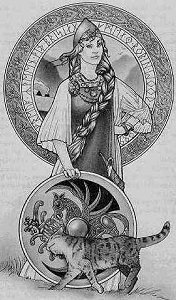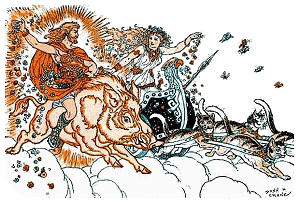 Patron Deity - Freya
Patron Deity - Freya 
Freya was (so far as we know) the most widely known of the early Germanic goddesses.
Her name appears in Old Norse, Anglo-Saxon, and on the continent; as chief among the goddesses,
it was her name that was used for the sole feminine weekday as a translation for "Venus" - from
which we get the modern English "Friday". She is Wodan's wife not only in the Old Norse materials,
but in the Continental Origio gentum Langobardorum, where she likewise uses her wits to trick him
into giving victory to the menfolk of a woman who had prayed to her for help.
Freya's own name comes from an Indo-European root meaning "beloved", and is probably related to the
modern English word "frig" through this root, though neither is derived from the other. Of all the
goddesses, Frija is the most motherly. She is the closest thing to an All-Mother the Northern folk know.
When she appears in myth, her works are twofold: to care for and protect her children or favourites,
and to keep the bonds of society strong. Although Freya is a goddess of social order, she is sometimes
accused of unfaithfulness to Wodan. Further, the reference to one deity despoiling the shrine of another
is almost certainly not authentic: whatever the original mythological basis may have been.In one tale,
Freya appears as the queen whose person is one and the same with rulership: she is wedded to the god
who holds the realm, whoever that may be. Infidelity does not come into the question. Freya has no
direct battle-aspects - she does not, like the Frowe, go to the battlefield to choose the slain - but
she is able to ward those who do go to fight, her blessings keeping them whole and safe. She can also
bless and ward one at the beginning of any dangerous faring. Freya may also shape the turning of the
battle by her spinning from afar, and by the way in which she moves the warriors to go or stay. Her
earthly spinning shows forth the way in which she has worked to spin the dooms of the men around her,
and perhaps worked with the craft of her spinning to make sure the battle went as she wished.
Freya's own dwelling-place is called "Fensalir", "Fen-Halls". Though Freya is not one of the Wans,
her might clearly overlaps with theirs in this way. Freya is a goddess of human fruitfulness, called
upon for the getting and bearing of children. As the careful housewife and mother, who knows whether
children can be fed and clothed with the resources at hand or not, she might also be called upon to
lend her spiritual help to ensure the success of earthly means of fertility control and family planning.
Freya is never spoken of as making the fields fruitful - her realm is within the walls, the realm of
the home and hearth and all those who dwell there. Her only tie to agricultural fruitfulness comes through
her Continental shape as Perchte/Holda/Fru Gode, leader of the Wild Hunt (together with Wodan).
Although Freya is not a goddess of riches in general, those who want help in buying a house, making
home repairs, or taking care of their families would likely do well to call upon her.
Freya's magic is that of spinning and weaving, which were deeply important to the Northern folk; and it is
through this craft that her deeper ways may most easily be learned. The woman's spindle was the weapon
matching the man's sword, for it was a tool of great might with which the wise spinner could wreak
long-lasting weal or woe, and the Spindle is as much Freya's sign as the Hammer is Thonar's or the spear
Wodan's. Freya's working as spinner and weaver ties in with her character as the one who "knows all
though she says it not herself".
All workings having to do with home and hearth fall under Freya's rule. The most ordinary tasks such as
cooking and cleaning are holy to her, and a well-made meal or a well-scrubbed kitchen are sure to bring
her blessing. She is also the one who brings frith and joy within the wedding: Friday, though it is thought
unlucky for most things in Germanic folklore (perhaps because Christianity was particularly hostile towards
goddesses?) was still thought the best of days for a marriage. Indeed, we see that even when Freya strives
against Wodan, it is not by force that she wins her will, but by subtle workings.
The birch is the tree which Ásatrúar most associate with Freya. In Northern folklore, this tree is seen as
a fair white maiden for reasons which should be clear. It is used for cleansing both body and soul,
especially in the sauna, and birch branches were also placed above the door of a newly-wed-couple's house
to bless them with fruitfulness.
Other trees which may be associated with Freya are linden ("basswood" in America), as told above, and
beech,because its name "book-tree" links it with the rune perthro, the well of Wyrd, and Freya's role as
a seeress.Her herbs are motherwort, mugwort, yarrow, and all those herbs which work on the
female system and organs.
Although there is no Norse record of any animals of Freya, the goose is most associated with her in modern
times. The cow, the source of milk and life from early days, might also be associated with Freya. Milk is
surely the drink most traditionally given to the little wights of the home, and in modern times, it has been
found that Freya herself may be toasted and blessed with milk just as well as with alcohol
(unlike her husband,say...).
Colours associated with Freya today is light blue and white. Several folk have felt in modern times
(independently of one another) that her favourite jewels are made of silver and polished rock crystal,
a combination of which many women of the Migration and Viking Ages were certainly fond. It is generally
accepted that they were amulets of some sort, perhaps used for scrying; the specific identification of them
with Freya is based on modern intuition, extrapolation from her role as a seeress, and the fact that these
amulets were also a particular mark of womanly status. Although there is no historical evidence for it, those
who wish a ritual gesture to use as a sign for Freya might use a spiral to symbolize the turning
and winding of the spindle.
